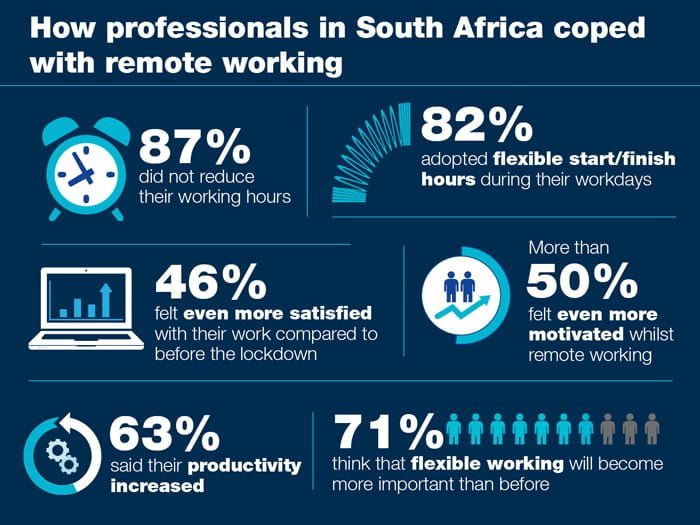Remote work, also known as telecommuting or working from home, has gained a lot of traction both globally and in South Africa, especially since the COVID-19 pandemic. But what is remote work, and what are the pros and cons?
The concept of remote work is simple: instead of commuting to a physical workplace, employees can work from any location where there is an internet connection.

What is Remote Work?
It is a flexible work arrangement that allows employees to work from home, a coffee shop, the beach, or any other location they choose, as long as they have a stable internet connection. This arrangement typically involves the use of digital communication tools, such as video conferencing, email, and instant messaging, to communicate with colleagues and complete work tasks.
Remote work is becoming increasingly popular among companies in South Africa and around the world. It allows them to hire employees from different parts of the world, access a larger talent pool, and reduce the overhead costs of maintaining a physical office.
The COVID-19 pandemic has had a significant impact on remote work, as many companies were forced to implement such work arrangements in order to comply with social distancing guidelines and avoid bankruptcy. In the post-pandemic world, this shift has highlighted the pros and cons of remote work. Many Fortune 500 companies have embraced remote work as the "new normal" and have even made it a permanent part of their future work arrangements, while others are still struggling to adapt.
What are the Pros and Cons of remote work?
The Pros
- It provides employees with greater flexibility and work-life balance, as they can work from the comfort of their own home or a location that suits them. This can help to reduce stress and burnout, as employees are less likely to experience the daily stresses associated with commuting and working in a traditional office environment. Digital Nomads are people who travel freely while working remotely using technology and the internet. 9 tips on how to prevent burnout at work.
- Remote work can save employees time and money on transportation, meals, and other expenses associated with working in a physical office. This also has a positive impact on the environment.
- The employer benefits because of reduced overhead costs associated with maintaining a physical office, such as rent, utilities, and office supplies.
- Both the employer and employee benefit as the emphasis is placed on 'work outcomes', and not 'time spent in the office'.
- It can increase productivity as employees may have fewer distractions and can work during their most productive hours.
- Remote work also allows employers to access a larger talent pool, as they are not restricted to hiring from a specific geographic location. Organisations like Upwork, can help to diversify the company's workforce and bring in new perspectives and ideas.
The Cons
- Staff working remotely can experience social isolation and loneliness, as they may feel disconnected from their colleagues and company culture. This may make it difficult for employees to collaborate and build relationships with other team members, which can ultimately impact productivity and job satisfaction.
- Remote work can make it difficult to separate work from personal life. Employees may find themselves working longer hours or struggling to find a healthy work-life balance.
- Employees that work remotely can make it more difficult for managers to supervise and manage their staff. Without face-to-face interactions, managers may find it challenging to monitor employee performance, provide feedback, and ensure that work is being completed to a high standard. This can lead to communication breakdowns and reduced productivity, as employees may feel less accountable for their work.
- Remote workers may not have all the required tools to be able to work productively, specifically ergonomic office furniture. There are serious health risks associated with poor work ergonomics. Consequences of sitting on the wrong chair.
- Creating a suitable home office needs careful planning and may result in additional costs for both the employee and the employer. Home Office Ideas for Remote Work.
Suitability
Remote work may not be suitable for all types of jobs or industries. Some jobs require physical presence or face-to-face interaction, for example:
- healthcare workers
- retail staff
- hospitality workers
- manufacturing workers.
Some employees may prefer to work in an office environment, and companies may need to provide a mix of on-site and off-site work, or hybrid work. 5 Requirements for Hybrid Work.

While it is suitable for some people, there are certain groups of people who may be disadvantaged by having to work remotely, namely:
- Workers who lack access to technology and a reliable internet connection:
Remote work relies heavily on technology and a reliable internet connection. Workers who do not have access to these resources may struggle to work remotely and will be at a disadvantage. - Employees who require in-person interaction or hands-on work:
Some jobs require physical presence or face-to-face interaction, such as healthcare workers, retail staff, or manufacturing and construction workers. - Workers who rely on social interaction:
Some people enjoy the social interaction and sense of community that comes with working in an office environment. Working off-site can be isolating and may lead to feelings of loneliness or disconnection. Mental Health in the Workspace - People who face distractions or have difficulty working from home:
Working from home requires a certain level of self-discipline and motivation. Workers who face distractions at home or who have difficulty focusing may struggle and be at a disadvantage. - Workers who don't have an ergonomic home office setup:
Without the proper setup, remote work can lead to physical discomfort or health issues, such as back pain or eye strain. Home office setup.
- Workers who lack access to technology and a reliable internet connection:
What resources are required for remote working?
Making remote work successful requires a combination of resources and strategies to ensure that employees can work effectively and productively from their off-site locations.
a) Technology
Working away from the office relies heavily on technology to enable employees to communicate, collaborate, and access work materials.
This includes hardware such as laptops or desktop computers, reliable high-speed internet, video conferencing software, project management tools, and collaboration platforms. To improve online security, most companies require that remote workers access company data files via a secure VPN.

b) Stable Power Supply
In countries like South Africa where there is an inconsistent power supply and load shedding, some form of backup power is essential for any employee that works remotely.
c) Communication Tools
Effective communication is essential for anyone working from home. Companies should ensure that employees have access to communication tools, such as instant messaging, email, and video conferencing, to stay connected with their colleagues.
d) Ergonomic Equipment
For remote work, it is crucial for employees to have access to suitable ergonomic office equipment, such as a desk and chair. The employer has a duty of care to ensure that this is provided. Failure to do so increases the risk of injury or discomfort associated with prolonged sitting or repetitive motions.
Having the right desk and chair is not sufficient. You need to be able to set up your chair and workstation correctly.
e) Employee Training
Companies must ensure that employees are equipped with the necessary skills and knowledge to work remotely. Training should include effective work practices, communication, and collaboration tools.
f) Support and resources
Employers should provide employees with resources and support, such as mental health resources, social connection opportunities, and technical support, to help them succeed in this environment.

How are countries promoting remote work?
a) Tax incentives
Several countries, including Italy and Japan, offer tax incentives to companies that allow their employees to work remotely. These incentives may include reduced tax rates, tax credits, or deductions for expenses incurred while working at home.
b) Infrastructure
Countries such as Estonia and Portugal, have invested in digital infrastructure to support anyone working remotely. This includes high-speed internet, cloud-based services, and other digital tools.
c) Regulation
Some states have passed laws and regulations to promote working from home. For example, Spain passed a law in 2020 that grants employees the right to request remote work, and France has introduced legislation that promotes teleworking as a way to reduce greenhouse gas emissions.
d) Education and training
Several countries, including Denmark and the Netherlands, have launched education and training programs to help employees and companies adopt remote work. These programs provide training and offer support for companies transitioning to remote work.
e) Public campaigns
Ireland and New Zealand have launched public campaigns to promote remote work. These campaigns raise awareness and provide resources and support for employees and companies looking to adopt this new way of working.
Remote Work in South Africa
Before the pandemic, remote work was already gaining popularity in South Africa, particularly in the technology and startup sectors. However, COVID-19 accelerated this process and many companies have seen the benefits of allowing their employees to work from home.
South Africa has a relatively well-developed digital infrastructure, which has made it easier for workers to stay connected and work efficiently from their homes.
The relatively high unemployment rate and skills shortage in South Africa has made it attractive for companies to adopt remote work arrangements. It allows organisations to reduce their overhead costs and hire talent from a larger pool, including retired or semi-retired workers.
Conclusion
Working from home is increasingly commonplace because of available technology solutions that empower remote workers. It is not simply a fad; it is here to stay. Amongst the pros and cons of remote work, perhaps the greatest advantage is that employees achieve a better work-life balance, while employers place a greater emphasis on work outcomes.
By the same author:

Why Every Production Line Needs the Right Industrial Chair
Invest in the right industrial chair to boost productivity, reduce injuries, and support factory workers on your production line.

Why Automated Fabric Cutting improves quality
High quality office and casino seating requires advanced automation, like automated fabric cutting.

Why an ergonomic chair has even more relevance in a 4-day work week
A 4-day work week can result in people sitting continuously for long hours, making an ergonomic chair a “no brainer”.




